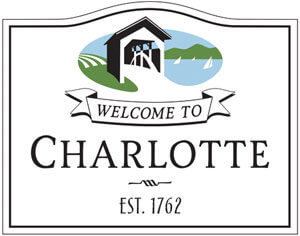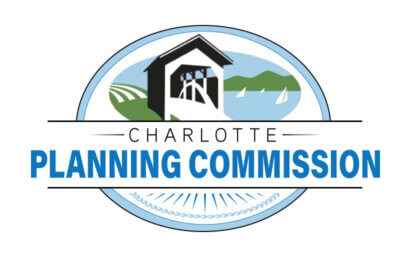A vote next week on a Town Plan amendment. Wait…what is that and why are we voting on it?

An amendment to the Town Plan is on the Nov. 5 ballot. Before anyone’s eyes start glazing over, an explainer is in order: What is the town plan? Why is it being amended? What does this have to do with Charlotte, and why do we need to vote on it?
What is the town plan?
The Town Plan was initially developed in 2016 with the intention of laying out a map for the future of Charlotte; the amendment for 2019 ensures that the town is in compliance with the Vermont Department of Public Service’s Energy Planning Standards for Municipal Plans. The plan was developed by the Planning Commission, with assistance from the Chittenden County Regional Planning Commission and input from the public both at Planning Commission and Selectboard meetings.
As time passes, laws change and energy site planning evolves, it’s up to the Planning Commission to make sure that Charlotte complies with regulations set forth by the state and to ensure that development and energy use is thoughtful and well planned.
The Planning Commission presented the amendment to the Selectboard last December, and two hearings, which lasted over five public meetings, concluded this August, after which the amendment will be put to a vote, which happens next Tuesday.
Why is there an amendment?
According to the town web site, the amendment was created to address compliance for two acts passed by the Vermont legislature: Act 171, passed in 2018, and Act 174, passed in 2016.
The State of Vermont Agency of Natural Resources explains on its website: “Act 171 amended Vermont Planning Statutes to encourage and allow municipalities to address protection of forest blocks and habitat connectors while supporting the local forest products industry.” This means that with the help of regional planning commissions, the state requires towns to “include specific policies on how the community will take steps to reduce forest fragmentation, enhance forest health, and support essential ecological functions.”
Act 174 deals with energy planning. The State of Vermont Department of Public Service’s (DPS) website says it “establishes a new set of municipal and regional energy planning standards, which if met allow those plans to carry greater weight—substantial deference—in the Section 248 siting process for energy generation.”
Hang in there. What is substantial deference? The DPS website defines it like this: “Substantial deference provides towns and regions a strong voice in determining where energy projects should, and should not, be sited.”
In order for Charlotte and other towns to remain up to date with current energy standards and mandates set forth by the state legislature, amendments are made to municipal plans to set a course for progress that takes into consideration both the law and the land.
What does this have to do with Charlotte?
Charlotte’s Town Plan, the entirety of which is available online, is a comprehensive explanation of the town’s past and present and what the town hopes for in the future, development- and energy-wise.
The DPS has goals for energy use and development across the state; this amendment exists to make sure that Charlotte is actively participating in and planning to reduce greenhouse gases, employ renewable energy and plan for its use in the future, and meet building efficiency goals.
Maps on the Charlotte town website show exactly what the Planning Commission has been working on. They show potential solar energy and wind energy sites, as well as existing renewable energy generation sites and the known and possible geographical constraints to future energy sites.
Considering forest locations, wildlife habitats, and natural resources and ecological patterns while developing a sustainable energy plan means that Charlotte can plan for the future and simultaneously protect its land and wildlife.
Because the Town Plan is a document created by and for Charlotte residents, changes must be approved by the town as a whole. Voting on the amendment will take place in the multi-purpose room at Charlotte Central School on November 5 from 7:00 a.m. to 7:00 p.m.
Related Stories
Popular Stories
If you enjoy The Charlotte News, please consider making a donation. Your gift will help us produce more stories like this. The majority of our budget comes from charitable contributions. Your gift helps sustain The Charlotte News, keeping it a free service for everyone in town. Thank you.
Andrew Zehner, Board Chair







